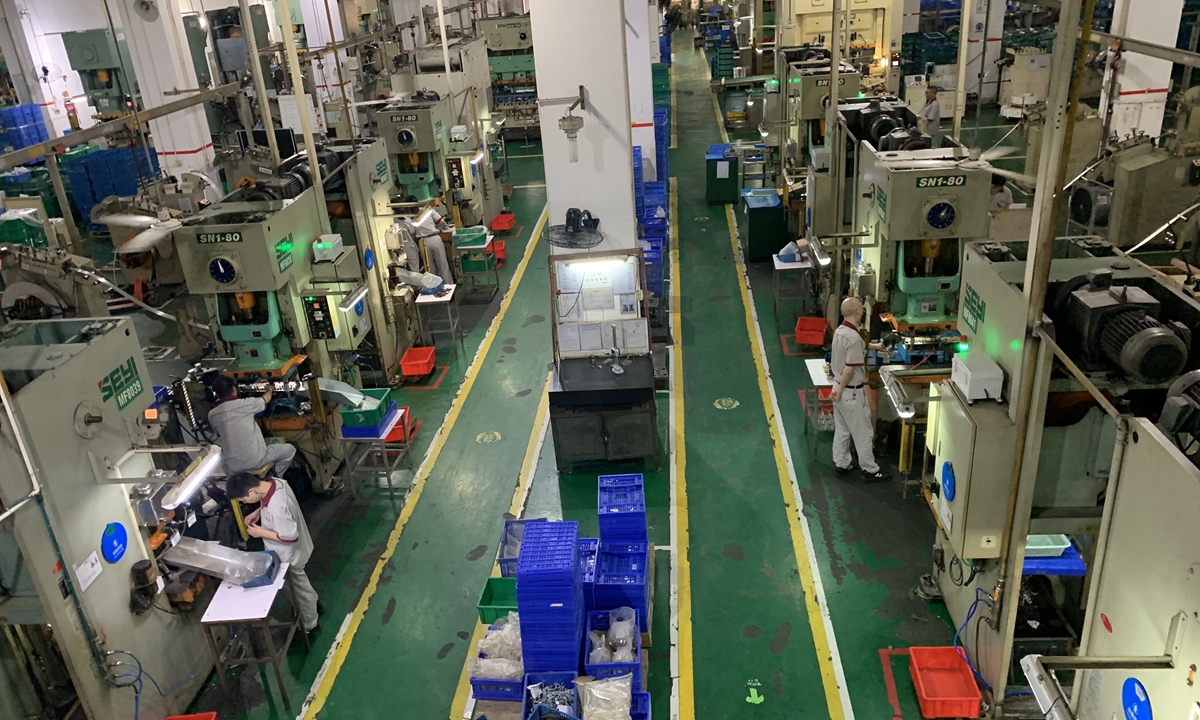
A Taiwan factory that makes electronic components and iron-made hardware parts for various devices are equipped with automatic machines to increase production output. Photo: Chen Qingqing/GT
Facing the worst drought in 56 years, the manufacturing of semiconductors on the island of Taiwan has drawn much attention as a sudden global shortage of microchips even halted production for several global auto giants.
While the leading Taiwan-based chipmakers have reportedly initiated water wagons as emergency supply, the situation also reflects severe lack of economic independence of the island.
After the recent snowstorm in central and southern US and the earthquake in Japan, the global semiconductor industry is now encountering an intensifying draught on the island of Taiwan. The worst drought in decades has affected more than 1.3 million households as some cities and counties, for the first time, were initiating reduced pressure tap water supply.
The semiconductors manufacturing industry cannot ignore the risks posed by the drought. The island's leading chipmaker Taiwan Semiconductor Manufacturing Co (TSMC) has arranged water wagons to ensure its production not to stop, Vanguard International Semiconductor Co and United Microelectronics Co have also enhanced efforts to ensure water supply, according to media reports.
The instability of industrial facilities has, again, revealed the weakness of Taiwan's manufacturing industry. The island appeared incapable of fostering a stable industrial chain while its outward dependency is difficult to be reduced, especially on Chinese mainland market - which has long been a strong and stable driven power for the economic growth of the island.
From raw materials supply, industrial chain capability, to export destination, Taiwan industries' dependency on the mainland is deep and all-sided. Even against the backdrop of the once-in-a-century COVID-19 pandemic, the island reported resilient economic growth with record high proportion of exports shipped to the mainland in 2020.
In the meantime, water shortage and the growing stress on power supply are not new challenges facing the Taiwan island. In August 2018, a water pipeline connecting the Chinese mainland's coastal province of Fujian to Kinmen, a small island of Taiwan, became operational, relieving the immediate needs of the people's livelihood as well as construction and development of Kinmen.
However, after the Chinese mainland recently suspended pineapple imports from Taiwan island due to the detection of pests, some politicians and media outlets on the island are unwilling to face up to the problem and take measures to enhance pest control. Instead, they have stepped up efforts to pull political hype.
Some netizens on the island even claimed to ban chips export to the mainland as a "countermeasure." Though we believe it was only meaningless grumbling from a few irrational netizens and didn't represent the majority voice on the island, the absurdity of the suggestion cannot be denied.
It is clear that the island of Taiwan, which shipped over 40 percent of its export to the mainland in 2020, needs the mainland market to pursue a stable economic growth. And for its key microchip manufacturing industry, not only can it not be able to cut ties with the market, better integrating to the thriving semiconductor sector in the mainland will be crucial for development of the chipmakers.




